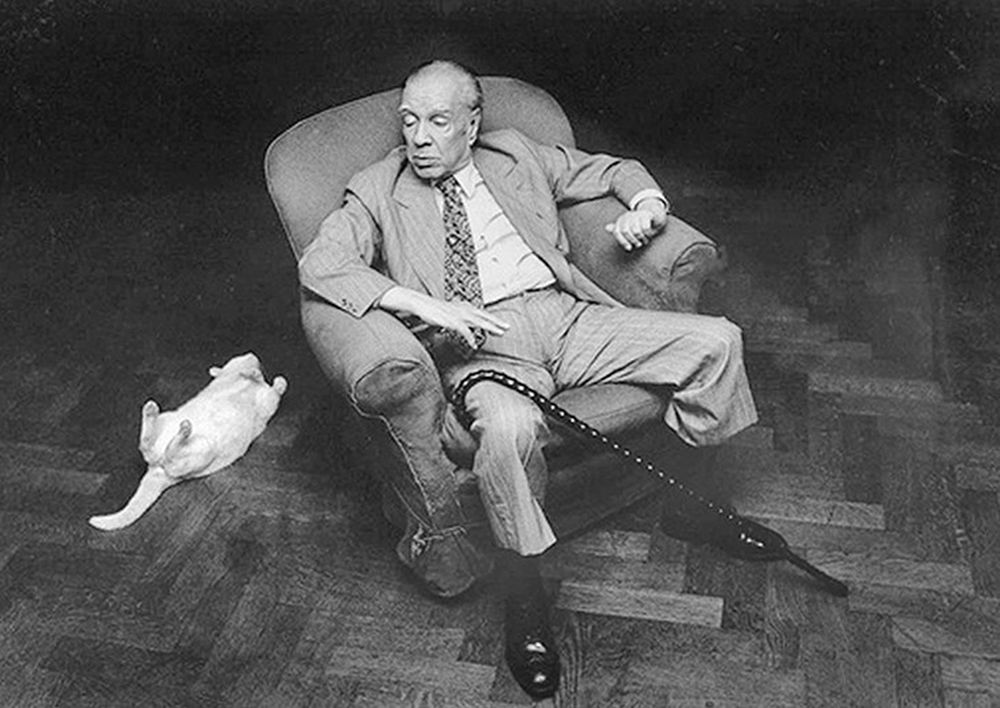BORGES, SWEDENBORG AND MYSTICISM

EVENT: BORGES, SWEDENBORG AND MYSTICISM
DATE: 11th July 2013
TIME: 7.00 pm
VENUE: Swedenborg Hall, Swedenborg House, 20/21 Bloomsbury Way, London WC1A 2TH
SPEAKER/S: William Rowlandson
7.00 pm (doors open at 6.30 pm | Swedenborg Hall, 20-21 Bloomsbury Way, London, WC1A 2TH | Admission is free but capacity is limited | BOOK YOUR PLACES NOW
On Thursday 11 July, we will be delighted to welcome Dr William Rowlandson to Swedenborg Hall, to talk about his new book, Borges, Swedenborg and Mysticism (Peter Lang, 2013). William’s talk is entitled: ‘ “Heaven and Hell are conditions of the Soul” (Borges): The Abiding Presence of Swedenborg in the Works of Jorge Luis Borges’.
JORGE LUIS BORGES admired Swedenborg and wrote extensively about him, paying close attention to his other-world journeys, communication with angels, demons and the discarnate souls of the dead. Indeed the many mystical and anomalous features of Borges’ works are greatly influenced by his reading of Swedenborg. Borges repeatedly defended Swedenborg against charges of insanity, arguing that the man was remarkably lucid, that his accounts were the product of a profoundly intellectual mind, and that his voyages constituted journeys of discovery akin to Swedenborg’s Viking ancestors. ‘Swedenborg’, wrote Borges, ‘is the first explorer of the other world. An explorer we should take seriously’.
Whilst the reader of Swedenborg is presented with challenges to assumptions about life, death, angelic beings and the divine, the reader of Borges’s texts concerning Swedenborg is presented with an equally challenging set of questions concerning the relationship between fact and fiction, realism and fantasy, voyages of discovery and poetry, orthodoxy and heterodoxy. Expanding this, it becomes clear that all of Borges’ writings concerning the ill-defined traditions of mysticism are characterized by equally puzzling questions of the nature of the real derived in large measure from Swedenborg’s works.
WILLIAM ROWLANDSON Ph.D. is senior lecturer in Hispanic Studies at the University of Kent. He has recently completed Borges, Swedenborg & Mysticism, a book which examines the relationship between Borges’s own recorded mystical experiences and his appraisal of Swedenborg and other mystics. The book asks the essential question of whether Borges was a mystic by analysing his writings, including short stories, essays, poems and interviews, alongside scholarly writings on mysticism by figures such as William James. William’s work on Cuban poet and novelist José Lezama Lima concentrated on Lezama’s equation of poetry and the numinous. His published articles concern various areas of Latin American studies, including the history of Guantánamo Bay and Gitmo detention centre, rendition, torture, Cuba during the War on Terror. He has also published analyses of Borges, Lezama Lima, Cabrera Infante and Rulfo. William teaches aspects of Latin American cultural history, the prose and poetry of Borges, Cuban literature and film of the revolutionary era
Doors open at 6.30 pm for a 7.00 pm start. Refreshments will also be available. Admission is free but capacity is limited; advance booking is highly recommended via nora@swedenborg.org.uk.
ABSTRACT
Heaven and Hell are Conditions of the Soul: The Abiding Presence of Swedenborg in the Works of Jorge Luis Borges
Abstract by Dr William Rowlandson | Talk | 11 July 2013 | Swedenborg Hall, 20-21 Bloomsbury Way, London, WC1A 2TH | Free Admission | BOOK YOUR PLACES NOW
JORGE LUIS BORGES admired Swedenborg and wrote extensively about him, paying close attention to his otherworld journeys, communication with angels, demons and the discarnate souls of the dead; indeed the many mystical and anomalous features of Borges’ works are greatly influenced by his reading of Swedenborg. Borges repeatedly defended Swedenborg against charges of insanity, arguing that the man was remarkably lucid, that his accounts were the product of a profoundly intellectual mind, and that his voyages constituted journeys of discovery akin to Swedenborg’s Viking ancestors. ‘Swedenborg,’ wrote Borges, ‘is the first explorer of the other world. An explorer we should take seriously’. Whilst the reader of Swedenborg is presented with challenges to assumptions about life, death, angelic beings and the divine, the reader of Borges’ texts concerning Swedenborg is presented with an equally challenging set of questions concerning the relationship between fact and fiction, realism and fantasy, voyages of discovery and poetry, orthodoxy and heterodoxy. Expanding this, it becomes clear that all of Borges’ writings concerning the ill-defined traditions of mysticism are characterized by equally puzzling questions of the nature of the real derived in large measure from Swedenborg’s works.
However, beyond the many references, and beyond the employment of Swedenborg in his critical reflections on mysticism, to what extent was Borges’ poetic and fictional aesthetic influenced by Swedenborg? In this presentation I concentrate on the narrative space of the tales and poems in order to investigate the abiding presence of Swedenborgian ideas of heavens and hells, the persistence of the soul after death, the landscape of the visionary world and the symbolic aspect of dreams. Importantly, and surprisingly given Borges’ seeming disdain for the moral aspect of theological works, I intuit in Borges’ work a strong ethical dimension that bears visible hallmarks of the heavenly ethos of Swedenborg, in particular, his strikingly Swedenborgian perspective that heavens and hells are states of the soul that surround us even in life, and that the ethical instinct within us encourages us to choose those pathways most appropriate to our moral state. The work of Borges, I argue, is most profoundly Swedenborgian.
Borges, Swedenborg & Mysticism by Dr William Rowlandson (Peter Lang, 2013)
